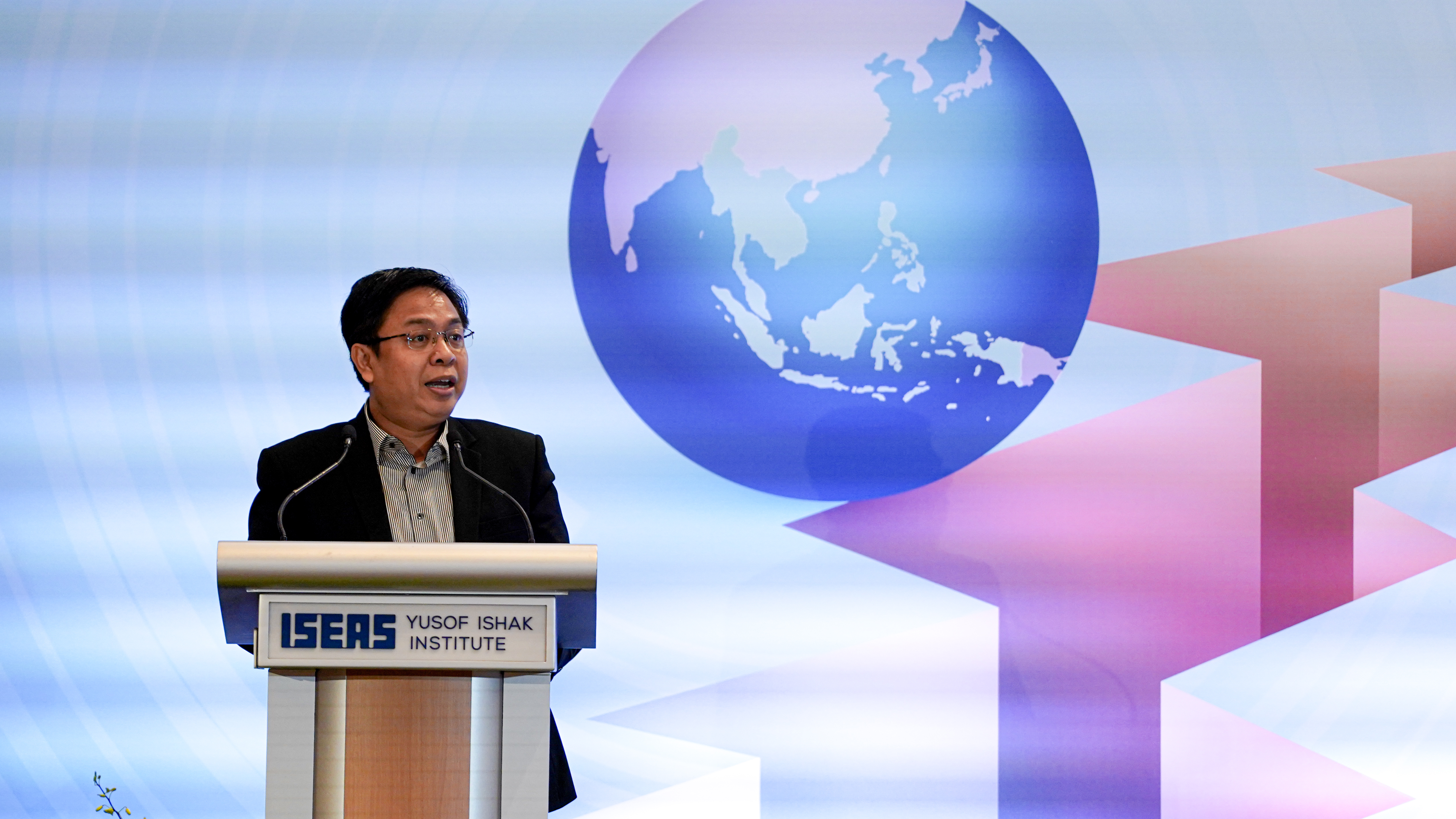All three Indonesian presidential candidates will continue Jokowi's signature policies if elected, said the former Deputy Chief of Staff to Joko "Jokowi" Widodo, Yanuar Nugroho, at the ISEAS – Yusof Ishak Institute's Regional Outlook Forum on Jan. 10.
"Will Jokowi's signature policies, including Nusantara, the new capital— will the signature policies continue? The answer is yes. A clear yes," the Indonesian academic added.
The three Indonesian presidential candidates are Ganjar Pranowo, the former governor of Central Java, Prabowo Subianto, Indonesia's Minister of Defense, and Anies Baswedan, the former governor of Jakarta.
 Yanuar Nugroho at the ISEAS – Yusof Ishak Institute's Regional Outlook Forum, Jan. 10. Image by Keyla Supharta.
Yanuar Nugroho at the ISEAS – Yusof Ishak Institute's Regional Outlook Forum, Jan. 10. Image by Keyla Supharta.
Jokowi's signature policies
Yanuar broke down Jokowi's signature policies into three categories— infrastructure, social protection, and downstreaming.
All candidates see infrastructure— particularly connectivity infrastructure, ports, industrial complexes, and economic zones— as crucial, Yanuar said.
All candidates also see social protection, particularly social assistance as key. Though the way these policies would be delivered may differ to some extent, all candidates will "certainly" continue the policies.
All three presidential hopefuls will also continue downstreaming, having recognised the importance of value-adding and not selling raw materials or commodities as it is.
The Nusantara project
On top of Jokowi's key policies is his plan to move Indonesia's capital from Jakarta to Nusantara.
The three candidates have differing stances on the Nusantara project, Yanuar said.
Ganjar and Prabowo are for the project
Both Ganjar and Prabowo will continue the new capital project, although they have differing levels of support.
Prabowo "strongly supports" the new capital project, stating that it is a necessity to develop other parts of the country. He has also emphasised that the planning of the project ensures that execution is done as sustainably and environmentally friendly as possible.
Ganjar has "neutral support" for the project, stating that further studies are needed before making a decision. The former Central Java governor expressed concern about the potential of the new capital on the environment and livelihoods of the indigenous people in East Kalimantan.
Ganjar is, however, "brave enough" to say that he offers corrective measures for what might have been neglected in the development of the new capital so far, Yanuar said.
Anies is vocal against moving the capital
Anies, on the other hand, is known to be critical and openly vocal against moving the capital.
He has questioned its feasibility and cost, and argued that the government should focus on addressing other issues such as poverty and inequality.
However, Yanuar said that the former Jakarta governor "cannot do much" other than to delay or slow down the development of the capital, unless he can change the law.
In the chance that Anies wins the election, Yanuar observed that his coalition might not be strong enough to change the law, which will force him to continue the Nusantara project.
No significant shift
Speaking at the same panel, Professor of Political Science at Islamic State University Burhanuddin Muhtadi expressed the same sentiment as Yanuar.
Every candidate and political party will face the same economic and political challenges, and while they will emphasise their differences, once the candidate is in office, they will seek "pragmatic and concrete" solutions, he added.
With the exception of religious issues, a major change in government policy from the presidential candidates is unlikely in the future, he said.
 Burhanuddin Muhtadi at the ISEAS – Yusof Ishak Institute's Regional Outlook Forum, Jan. 10.
Burhanuddin Muhtadi at the ISEAS – Yusof Ishak Institute's Regional Outlook Forum, Jan. 10.
More than 205 million Indonesians voting on Feb. 14
As Indonesia inches closer to the election on Feb. 14, its three presidential candidates have been continuing to woo voters to their side.
Many are scrutinising whether these candidates will continue the policies laid down by their popular predecessor, Jokowi, who enjoys an approval rating of over 75 per cent as of December 2023.
The three presidential hopefuls recently concluded their third televised live debate and their running mate will be gearing up for the fourth debate on 21st January.
Nearly 205 million local and overseas Indonesians will vote for their next president during the election.
Top image via Presiden Joko Widodo/Facebook.

If you like what you read, follow us on Facebook, Instagram, Twitter and Telegram to get the latest updates.



